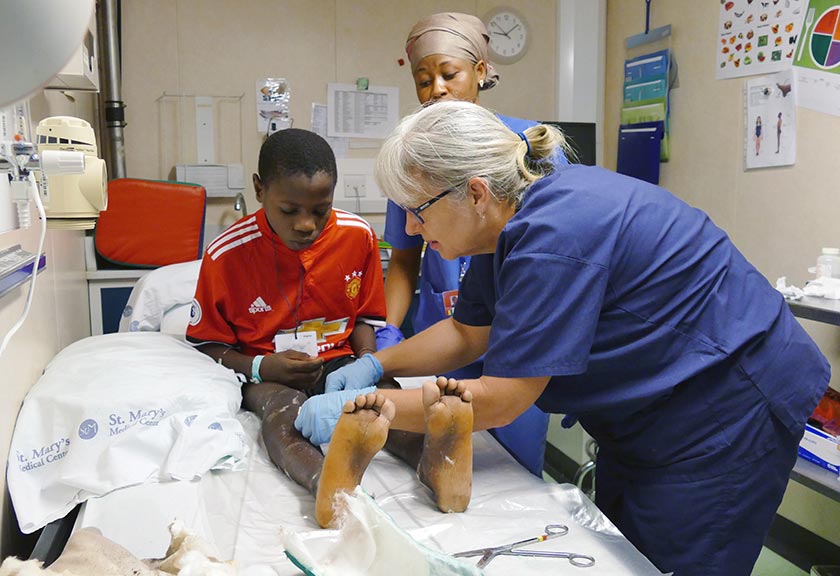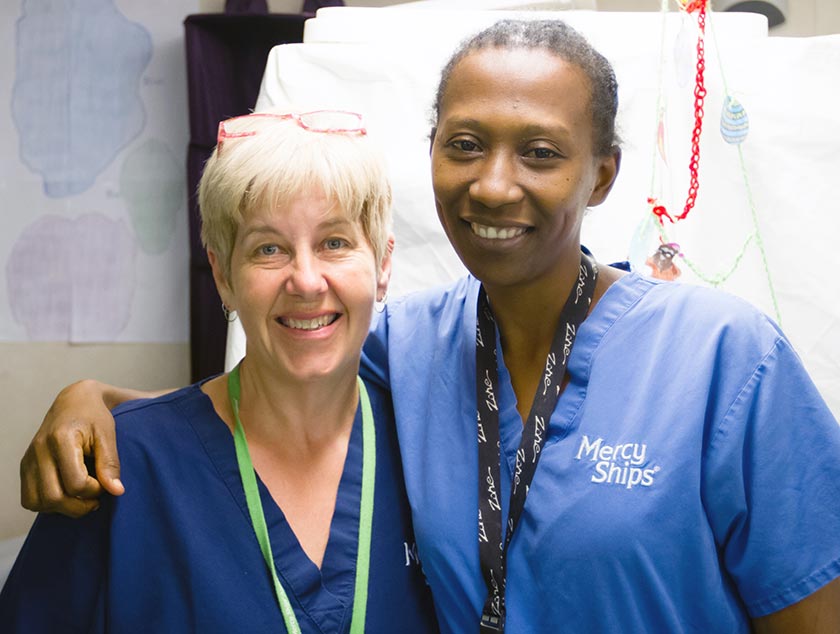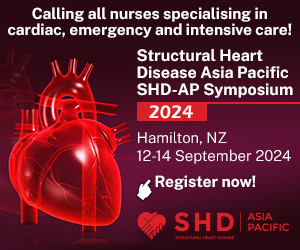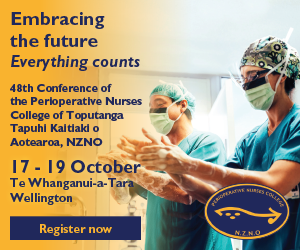
As Robyn Ferguson searched for a volunteer nursing opportunity to “give back”, using the skills gained over her extensive nursing career, she found Mercy Ships – the hospital ship charity providing surgical care in Africa for patients who would otherwise have little access to essential services.
The Wellingtonian was inspired by her three-month tour of duty in 2010. She is now a familiar face among the 450-strong international crew, as volunteering with Mercy Ships has become a priority she works into her annual calendar. The most recent field service in Senegal, West Africa – paused due to COVID-19 – was Ferguson’s ninth time volunteering on board the Africa Mercy.
The hospital ship has five operating theatres, 80 ward beds, intensive care, and all the required auxiliary services to treat patients in the specialties provided – ophthalmic, maxillofacial, paediatric orthopaedic, women’s health, burns and plastic reconstruction, and paediatric general surgery. Other services include mental and oral health, palliative care, and Ponseti treatment for babies born with clubfoot.
For ten months at a time, the self-contained floating hospital provides free care in low-income countries where health-care resources are usually inaccessible and unaffordable. “The long queues of people at the Mercy Ships health screenings show how desperate people are for treatment; many have walked for days to get to one of our clinics,” Ferguson explained.
One of the unique aspects of the Mercy Ships wards is the level of interaction between the patients – people who were strangers before admission. “Patients support each other and follow cues from others who have been in the ward longer. It is very community-based. In western countries, people want privacy from others and would not think of asking another patient what to do, or they would not want to be seen to interfere.
“As patients don’t speak English, we have ward translators, but they are not medically-trained. I have been known to resort to making up my own sign language to show patients what needs to be done. When caring for obstetric fistula patients who needed perineal/catheter care, I had the habit of indicating time for this treatment by saying and acting ‘wash’. One day a patient asked for Mama WashWash, which apparently was me!”
The Mercy Ships hospital processes were familiar to Ferguson from the beginning. “There are nurses from across the globe with different nursing backgrounds and styles, so on-board care pathways guide our day-to-day care for different specialties, similar to pathways used at home. There are policies and procedures to follow like hand hygiene, infection control and intravenous therapy, all in line with my nursing experience.
“The equipment is similar. I was surprised to see more blood pressure machines on the ward of 20 patients than we had on the ward of 30 I had left in New Zealand.”
The most surprising aspect of nursing on board for Ferguson was how easily the patients accept the foreign health professionals. “They come into an unfamiliar environment, not speaking or understanding the language, and not knowing what the outcome of their surgery will be. After seeing other patients’ reactions, they are encouraged. They relax and settle in, letting us hold their hands and accepting hugs. They sing and dance and laugh.
“One day I gave a hug to a lady who was crying. When she settled, the patient in the next bed put her arms out for a hug too. Then I had to give a hug to all the ladies in the ward. This became a part of my working day.”
Mentoring and teaching
With an emphasis on mentoring and teaching, Mercy Ships leans on the experience of professionals like Ferguson to strengthen the health-care capacity of the host nation. “If we were doing surgery without mentoring, teaching and training, then change won’t happen,” she said. “We help the local nurses, doctors and technicians learn new skills. We provide protocols like the World Health Organization safe surgery checklist, demonstrate the importance of hand hygiene and teach specific surgical techniques. Local colleagues teach this to others, improving on what they are already doing.”

“I love Africa, the people, community spirit, the sights and sounds, the chaos and the acceptance. I make friends in each of the countries Mercy Ships visit, and they stay with me always,” Ferguson said.
According to the Lancet Commission on Global Surgery, inadequate access to surgery kills 16 million people annually, more deaths than malaria, HIV, and tuberculosis combined.
Global Mercy to be launched
As the global backlog of surgical care has escalated during COVID-19, there has never been a more urgent time for Mercy Ships to double its services for people who live in low-income countries in Africa. The deployment of a new Mercy Ship Global Mercy next year will more than double the surgical care the not-for-profit can provide to people with little other access to the essential services they require.
The new Mercy Ship is close to completion and will be on the water in 2021. The Global Mercy will have state-of-the-art technology and instrumentation, six operating theatres and 199 hospital beds.
Health-care mentoring and developing capacity in host nations is a critical part of all Mercy Ships programmes and to facilitate this, Global Mercy will have a training centre that includes a simulation lab, virtual reality stations, and the latest teaching equipment.
It is a very big ship and, for the volunteers, an experience potentially like no other. The new ship will be powered by 600 crew members from across the globe, and there will be ample accommodation to make nurses, surgeons, maritime crew, cooks, teachers, electricians, technicians and all our other essential people feel at home.
Over the next 50 years, it is estimated that more than 150,000 people’s lives will be changed on board the Global Mercy through surgery alone, with countless more lives helped by the ship’s medical training and infrastructure programmes. In close collaboration with host nations in Africa, the Global Mercy, together with the Africa Mercy, will more than double the charity’s work.
A video about the Mercy Ships can be seen at The Mercy Ships Response to Global Surgical Need.
For more information about volunteer opportunities for paediatric, theatre, wound care and other nurse specialists, go to Mercy Ships: Nurses – all aboard!
Sharon Walls is communications manager for Mercy Ships NZ.



